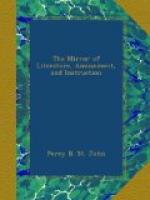“A short time before his death, the sacrament was administered to him. He declared that, though he disliked the government of the Church of England, he yet agreed with that Church as to all essential matters of doctrine. His intellect remained unclouded. When all was nearly over, he lay murmuring faint prayers for himself, and for the cause in which he died. ‘Lord Jesus,’ he exclaimed, in the moment of the last agony, ‘receive my soul—O Lord, save my country—O Lord, be merciful to—,’ In that broken ejaculation passed away his noble and fearless spirit.
“He was buried in the parish church of Hampden. His soldiers, bareheaded with reversed arms, and muffled drums, and colours, escorted his body to the grave, singing, as they marched, that lofty and melancholy psalm, in which the fragility of human life is contrasted with the immutability of Him, in whose sight a thousand years are but as yesterday when it is passed, and as a watch in the night.
“The news of Hampden’s death produced as great a consternation in his party, according to Clarendon, as if their whole army had been cut off. The journals of the time amply prove that the Parliament and all its friends were filled with grief and dismay. Lord Nugent has quoted a remarkable passage from the next Weekly Intelligencer. ’The loss of Colonel Hampden goeth near the heart of every man that loves the good of his king and country, and makes some conceive little content to be at the army now that he is gone. The memory of this deceased colonel is such, that in no age to come but it will more and more be had in honour and esteem;—a man so religious, and of that prudence, judgment, temper, valour, and integrity, that he hath left few his like behind him,’
“He had indeed left none his like behind him. There still remained, indeed, in his party, many acute intellects, many eloquent tongues, many brave and honest hearts. There still remained a rugged and clownish soldier,—half-fanatic, half-buffoon,—whose talents discerned as yet only by one penetrating eye, were equal to all the highest duties of the soldier and the prince. But in Hampden, and in Hampden alone, were united all the qualities which, at such a crisis, were necessary to save the state,—the valour and energy of Cromwell, the discernment and eloquence of Vane, the humanity and moderation of Manchester, the stern integrity of Hale, the ardent public spirit of Sidney. Others might possess the qualities which were necessary to save the popular party in the crisis of danger; he alone had both the power and the inclination to restrain its excesses in the hour of triumph. Others could conquer; he alone could reconcile.”
* * * * *
SNATCHES FROM EUGENE ARAM.
Love.—What a beautiful fabric would be human nature—what a divine guide would be human reason—if Love were indeed the stratum of the one, and the inspiration of the other.




